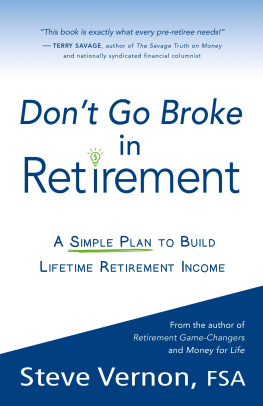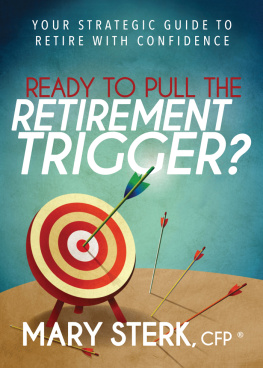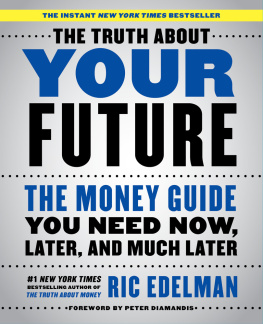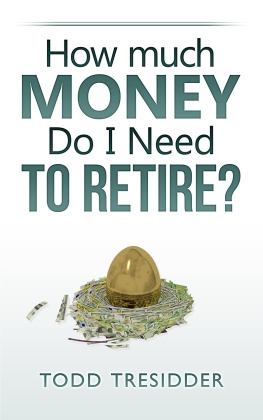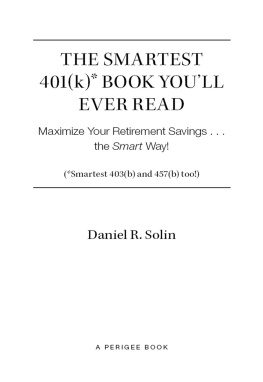PENGUIN CANADA
WHEN CAN I RETIRE?
ANDREW ALLENTUCK is an award-winning financial journalist whose recent book, Bonds for Canadians, received high praise. He currently writes the Family Finance feature for the Financial Post and a column on fixed-income investing for Investment Executive magazine. His monthly columns in the Financial Post Magazine won a National Business Writing Award. He has taught economics and economic history at several universities in the United States and Canada.
Also by Andrew Allentuck
Consumer Choice: The Economics of Personal Living
(co-authored with Gordon Bivens)
The Cost of Age
Who Speaks for the Patient?
Bonds for Canadians:
How to Build Wealth and Lower Risk in Your Portfolio
WHEN CAN
I RETIRE?
Planning Your Financial Life After Work
Andrew
Allentuck

PENGUIN CANADA
Published by the Penguin Group
Penguin Group (Canada), 90 Eglinton Avenue East, Suite 700, Toronto, Ontario, Canada M4P 2Y3 (a division of Pearson Canada Inc.)
Penguin Group (USA) Inc., 375 Hudson Street, New York, New York 10014, U.S.A.
Penguin Books Ltd, 80 Strand, London WC2R 0RL, England
Penguin Ireland, 25 St Stephens Green, Dublin 2, Ireland (a division of Penguin Books Ltd)
Penguin Group (Australia), 250 Camberwell Road, Camberwell, Victoria 3124, Australia
(a division of Pearson Australia Group Pty Ltd)
Penguin Books India Pvt Ltd, 11 Community Centre, Panchsheel Park, New Delhi 110 017, India
Penguin Group (NZ), 67 Apollo Drive, Rosedale, North Shore 0745, Auckland, New Zealand
(a division of Pearson New Zealand Ltd)
Penguin Books (South Africa) (Pty) Ltd, 24 Sturdee Avenue, Rosebank,
Johannesburg 2196, South Africa
Penguin Books Ltd, Registered Offices: 80 Strand, London WC2R 0RL, England
First published in Viking Canada hardcover by Penguin Group (Canada),
a division of Pearson Canada Inc., 2009
Published in this edition, 2011
1 2 3 4 5 6 7 8 9 10 (WEB)
Copyright Andrew Allentuck, 2009
All rights reserved. Without limiting the rights under copyright reserved above, no part of this publication may be reproduced, stored in or introduced into a retrieval system, or transmitted in any form or by any means (electronic, mechanical, photocopying, recording or otherwise), without the prior written permission of both the copyright owner and the above publisher of this book.
Manufactured in Canada.
LIBRARY AND ARCHIVES CANADA CATALOGUING IN PUBLICATION
Allentuck, Andrew, 1943
When can I retire? : planning your financial life after work / Andrew Allentuck.
ISBN 978-0-14-316795-2
1. Finance, PersonalCanada. 2. Tax planningCanada.
3. Estate planningCanada. 4. RetirementCanadaPlanning.
5. Pension trustsCanada. I. Title.
HG179.A458 2011 332.024014 C2010-906603-0
Except in the United States of America, this book is sold subject to the condition that it shall not, by way of trade or otherwise, be lent, re-sold, hired out, or otherwise circulated without the publishers prior consent in any form of binding or cover other than that in which it is published and without a similar condition including this condition being imposed on the subsequent purchaser.
Visit the Penguin Group (Canada) website at www.penguin.ca
Special and corporate bulk purchase rates available; please see www.penguin.ca/corporatesales or call 1-800-810-3104, ext. 2477 or 2474
For Adam and Kate, Sarah and Dov
Preface:
A Journey Together
The question When can I retire? is the most frequent and surely one of the most complex that people ask as they move through life from starting work to ending it. The problem of planning not to work is, in fact, a web of issues that involves budgeting for many years, the problem and uncertainty of mortality, deciding how much money to leave to children or to others, investment returns, and, of course, the very personal problem of what one will do with years of leisure time. It is a one-way decision for most of us and among the most important that we will ever make.
Retirement planning and the question of timing retirement require an assessment of ones capital, the desire to quit conventional work, and sufficient resources to cope with years or decades of life without a time sheet or need to show up at an office. The earlier one retires, the harder it is to see ahead. In truth, predicting anything more than a few months in the future is tough. Predicting what the financial world will be like in 10 or 20 or 30 years is nearly impossible. But it has to be done and, as I try to show in When Can I Retire?, it is best done with a sharp pencil and conservative assumptions. After all, to reach the last years of life flat broke is tragic.
There is a lot of such tragedy. I have examined many cases of poverty in old age through the Financial Facelift series of personal financial planning stories that I have written for the Financial Post and the Financial Post Magazine. I have heard from people who have drifted into poverty by failure to plan for the gift of a long life. That is regrettable, of course. Yet it is relatively rare for people to have nothing. After all, Canadas combination of Old Age Security enhanced by the Guaranteed Income Supplement ensures a modest level of income for almost every person age 65 or older.
People approaching old age understandably fear poverty. University students, with the hope of a career to come, find that poverty is bearable. But for the elderly, with little chance of generating large incomes late in life, poverty is harder to bear. Not surprisingly, it is dreaded.
The basis for fear is less logic than what Franklin Roosevelt identified as the cause of gloom for Americas future in the Great Depression when he said, We have nothing to fear but fear itself. That insight is worth a heap of psychology books, for when one can take decades to plan a life of work and a life after work, rationality should work.
It should, but the complexity of paying ones current bills, coping with investments and the legions of companies that sell insurance and mutual funds, paying for childrens music lessons and hockey practice and then university fees, and shepherding children into lives of their own seems to obscure the basic task of salting away enough capital to provide an acceptable way of life for a few decades after the end of formal work.
Myopiashort-sightednessis one reason it seems so hard to build up capital. Stock markets gyrate every day and week, month and year, but over time, they go up more than they go down. Ignore the wobbles and the outcome should be benevolent, even if it cannot be quantified years or even decades in advance of retirement. Bonds can produce dependable interest flow that, if compounded, can produce handsome fortunes over periods of many decades. If it is so easy, why should we need a book to get through the process?
The fundamentals are not the issue. Bureaucratic and legal complexity is. Tax law and rules for pension funds, international treaties for persons in one benefit plan living in another country, inflation and the variability of exchange rates that affect ones ability to live in Florida or France turn every retirement planner into a negotiator, trading certainty of bond income for the perhaps higher if riskier gains of investing in the stock market.
The earlier you retire, the more financial circumstancewealth, responsibilities, and rates of return on assetsmay change over time. If you cease work at age 80, your capital need last a shorter period than if you retire at age 50. Fortunately, stock markets tend to produce the best and least variable performance over long periods. It is the short run that is in doubt. Early retirement allows less time to save for retirement, but once retired, if one can preserve capital, it is likely to produce large gains in periods of two or more decades.
Next page


